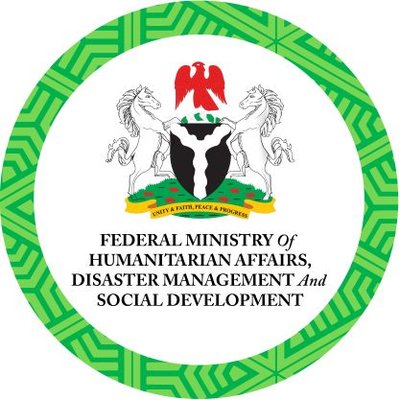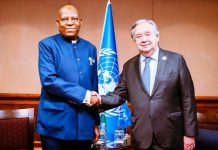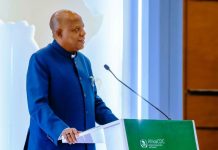The Federal Government has harped on the need for synergy between the government through the Ministry of Humanitarian Affairs and Disaster Management, Non-Governmental Agencies and other Government Agencies to tackle COVID-19.
This was made known at a one-day colloquium organized by the Humanitarian Affairs ministry in Abuja as it prepares for a second wave of COVID-19 in Nigeria or any similar occurrence.
The event which also provided a platform for cross pollination of ideas, lessons learnt and best practices will also be useful in preparing government and other relevant agencies for distribution of vaccines when they eventually arrive.
Speaking at the event, the Honorable Minister of Humanitarian Affairs Sadiya Umar Farouq told participants in her opening remarks, that the full scale of the impact of covid-19 was yet to be seen.
“So far, we have seen the impact on the economy and social fabric. Although, we have been able to manage the response quickly, with adequate planning, flexibility and adaptability in our approach, we must not be complacent”.
The Minister who was represented by the Permanent Secretary Bashir Nura Alkali called for the collaboration of all stakeholders to enhance synergy and avoid duplication of actions.
“As observed from the experience of the COVID-19 response in Nigeria and globally, it is obvious that traditional institutions, state and non-state, international and local agencies must work together to avoid unhealthy practices and duplication of actions.
“The Presidential Task Force on COVID-19 did a wonderful job in risk communication and community engagement in collaboration with the National Orientation Agency as well as UNICEF, to counter fake news and increase the level of public awareness and engagement. We will therefore recommend that all stakeholders can institutionalize interventions within individual oragnizations and agencies without just waiting on the PTF.”
Reviewing the COVID-19 humanitarian response intervention, relevant stakeholders and participants noted that the World Food Program initiative was successful in areas of collaboration with the government while observing risk mitigation measures to stop door to door distribution and cash transfers with the help of the Central Bank of Nigeria to authenticate account details of beneficiaries as well as setting up of food banks.
“In future, we will not wait till an emergency happens as we will embark on simulations, plans and test systems, coordination and harmonization to stay steps ahead”.
The Ministry while reviewing the role of the North East Development Commission, noticed that delivery of palliatives to states was a huge success.
However, stakeholders observed the duplication of distribution and proposed that in future, there should be horizontal and vertical communication between the ministry and the NEDC.
It was also proposed that banks and National Identity Management Commission should build a shock responsive system while there is need for legislation on social protection laws to recognize emergencies.
Stakeholders praised the International Organization on Migration (IOM) for sharing timely information about the pandemic, engagement of IDPs and production of masks.
In future, it was proposed that a process should be in place for food banks with the need for more information as witnessed in cases involving the fight against polio eradication and ebola outbreaks in Nigeria.
The participants also acknowledged the need for more collaborations with states during the planning process to have better knowledge of what is required of risk communication and community engagement while innovative approaches were recommended for future occurrence.
As critical stakeholders, the Farmers Home Administration (FMHA) were advised to involve actors beyond national government and non-state actors in delivery of interventions, put machinery in place for proper feedbacks from beneficiaries which is critical for planning purposes as well as look to Civil Society Groups and organized private sector for the purposes of information dissemination.
In her conclusion, the Minister appealed to the stakeholders to start early preparations ahead.
“We must work together to manage scarce resources, reinforce partnership, build new ones, explore new opportunities and continue to build bridges because more can be done collectively,” Umar Farouq stated.
NNEKA IKEM ANIBEZE
SA MEDIA
02-12-2020






